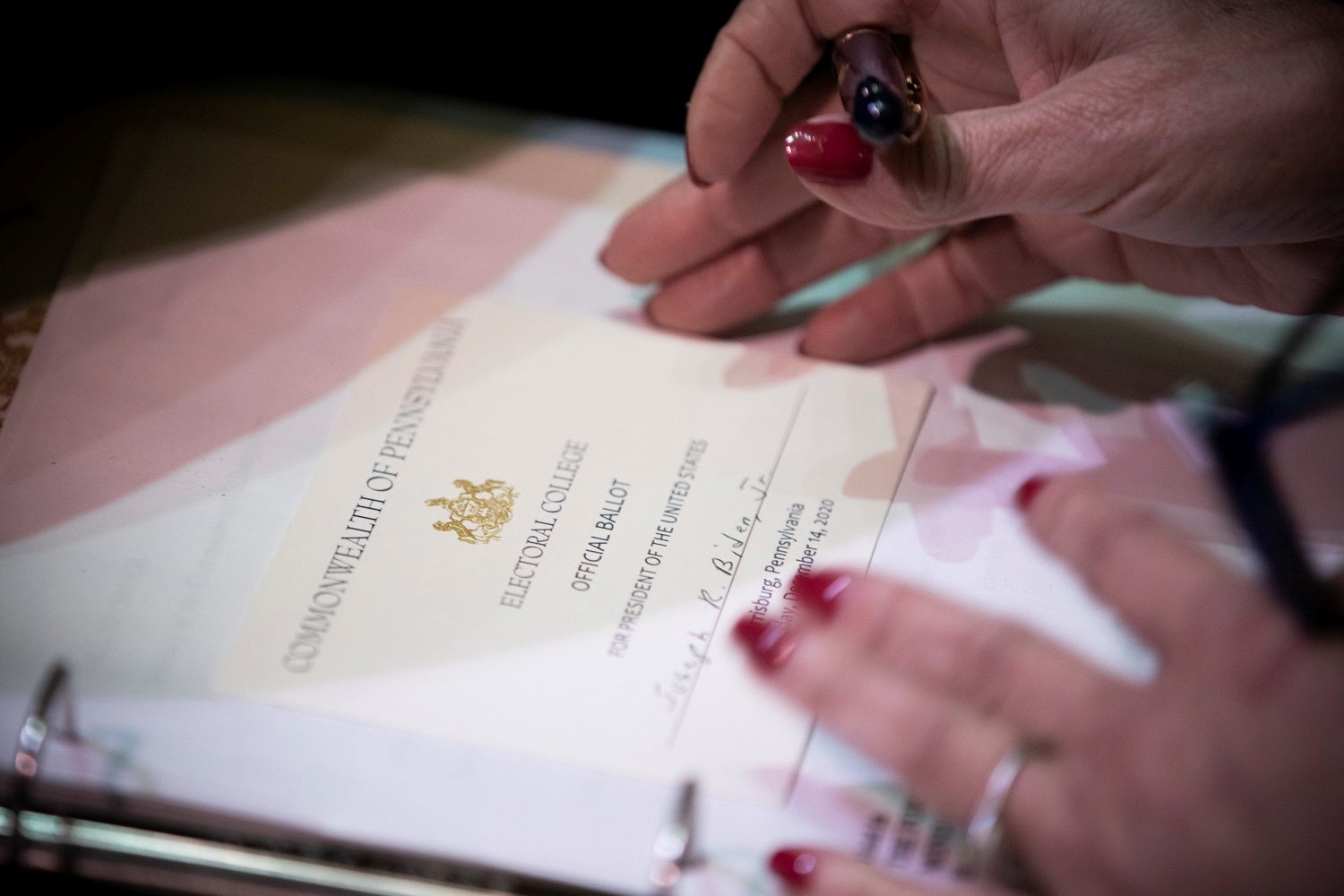Electoral college explained: What’s next for president-elect Joe Biden
A joint session of Congress will tally the results, sealing Trump’s defeat

Your support helps us to tell the story
From reproductive rights to climate change to Big Tech, The Independent is on the ground when the story is developing. Whether it's investigating the financials of Elon Musk's pro-Trump PAC or producing our latest documentary, 'The A Word', which shines a light on the American women fighting for reproductive rights, we know how important it is to parse out the facts from the messaging.
At such a critical moment in US history, we need reporters on the ground. Your donation allows us to keep sending journalists to speak to both sides of the story.
The Independent is trusted by Americans across the entire political spectrum. And unlike many other quality news outlets, we choose not to lock Americans out of our reporting and analysis with paywalls. We believe quality journalism should be available to everyone, paid for by those who can afford it.
Your support makes all the difference.Joe Biden has received 306 electoral college votes, securing his victory over Donald Trump in the 2020 presidential election.
Electors in California and Hawaii, the last two states to cast their electoral college votes, pushed Mr Biden beyond the 270 necessary votes to win the presidency, with Trump receiving 232.
The president’s ongoing litigation and attempts to undermine the results – from refusing to concede to blitzing swing states with spurious legal challenges and appealing to the US Supreme Court with a string of baseless voter fraud conspiracies – have brought an intense scrutiny to typically lower-key post-election procedures.
Despite alleged threats to electors and lawmakers, with protests leading up to the votes and conspiracy-backed demands to “stop the steal” surrounding them, the process went relatively smoothly.
Mr Trump, his allies and his campaign have filed roughly 50 lawsuits – most of which have been withdrawn or dismissed, including twice by the Supreme Court.
The votes on 14 December will officially send Mr Biden to the White House – but there remains one last procedural step.
Electoral college results will head to Washington, where they will be tallied on 6 January during a joint session of Congress. Vice president Mike Pence will preside.
But didn’t the US vote already?
Yes. But the results of the presidential election do not rely solely on the popular vote. When voters cast their ballots in a presidential election, they’re technically not voting directly for the candidates on the ballot. Instead, under the electoral college, votes are delivered for a preferred candidate’s electors.
After voters cast their ballots, whether by mail or in-person on or before Election Day, election workers tally the votes, which are then certified by state election officials and affirmed by secretaries of state and state governors. Then the Electoral College convenes.
What is the electoral college?
Electoral college electors are often party loyalists, or individuals close to the campaigns, selected by their respective parties, who have pledged to vote for the party’s respective candidate. In all but two states, the winner of the popular vote receives all of that state’s electoral college votes – no matter the margin of victory. The runner-up receives nothing.
All told, there are 538 electors in the electoral college: one for each member of the House of Representatives, two per US Senator, and three for Washington DC, all allocated through the 22nd Amendment.
After voters cast their ballots (and state officials certify the results), the electors then meet in December in their respective states, convening as the electoral college.
Thirty-three states and Washington DC legally bind electors to choose the winner of their state’s populate vote. Electors in the other 17 states can vote for someone else, though so-called “faithless electors” are rare and their defiance would likely nullify their vote.
Can Congress change the outcome?
Objections to the results from members of Congress would be debated in their respective chamber, followed by a vote to determine whether to reject the results. An objection would need to pass both chambers with a simple majority vote. It’s not likely there is any consensus to do so.
Why does the US do it this way?
Maps that paint each state red or blue are misleading – vast swaths of the country are rural, and most people in the US live in or near cities. People living in rural areas tend to vote for Republican presidential candidates, while far more people living in metropolitan areas and cities typically vote for Democratic candidates.
The electoral college is a compromise solution dating back to the origins of the country, when there was considerable concern that urban centres would dominate elections to the detriment of less populated areas.
Because the number of electors a state has is tied to its number of representatives in the House, more populous states have an edge because they wield more by virtue of having greater representation. So the founders determined that each state would also receive one elector per senator – of which each state has two, regardless of its size – thereby giving less populous states a boost.
A growing movement to abolish the Electoral College – and allow voters to directly determine the winner of the presidential election – has met an obvious resistance from the GOP.
More than a dozen states, representing 196 electoral votes, have signed on to the National Popular Vote Interstate Compact, which would pledge a state’s electors to the state’s respective popular vote winner.





Join our commenting forum
Join thought-provoking conversations, follow other Independent readers and see their replies
Comments